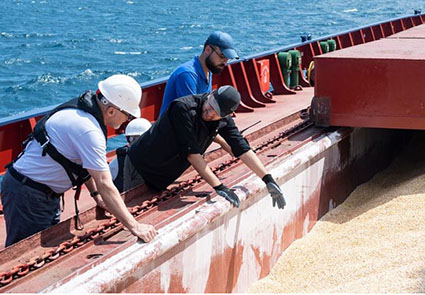Special to WorldTribune.com
Some good news from war weary Ukraine! And actually even better news for many developing countries dependent on Ukrainian food and fertilizer shipments which faced Russian naval blockades until mid-Summer.
Readers may remember that during July, a combination of United Nations and Turkish diplomacy with Russia led to an unprecedented deal which helped lift Putin’s siege of Ukrainian ports thus blocking vital food shipments. The system called the Black Sea Grain Initiative allowed for a win-win proposal whereby both Russia and Ukraine would open ports and allow for safe shipping to ease the global food crisis.

Ukraine, long the breadbasket of Europe, has been the big winner with hundreds of vessels leaving ports with vital food and fertilizer supplies for world markets, especially many in poorer countries in North Africa and the Middle East.
Related: Ukraine: Tiptoeing around a wider tragedy, August 28, 2022
By early November, 10 million metric tonnes of grain have been shipped through the Black Sea corridor over the past three months to reach this milestone. Pretty impressive.
Thus far 478 merchant ships have sailed from Ukrainian ports such as Odessa and Chomomorsk.
Headquarters for the Black Sea Grain Initiative is situated in Istanbul, Turkey. The ships sail along the strategic Bosporus passage dividing Europe and Asia and on to their destinations.
As UN Secretary General Antonio Guterres told correspondents, “Despite all the obstacles we have seen, the beacon of hope in the Black Sea is still shining. The initiative is working. It is our collective responsibility to keep it working.”
Sounds fine and perfectly logical until you realize that the Russians recently suspended their participation in the deal.
Moscow accused the Ukrainians of using Black Sea passage corridors to launch attack drones to attack Russian Navy ships in Crimea.
Delicate diplomacy followed to reopen the humanitarian corridor. Sources spoke of tense and intense phone “diplomacy” by the UN Secretary General and Turkish President Tayyip Erdogan with Russia’s leader Vladimir Putin to get the agreement back on track.
|
So why is this so important? Getting Ukraine’s bountiful Harvest to markets as well as delivering fertilizer for next year’s harvest. It’s all about food and commodity prices, especially in the developing world. |
Operations resumed and seven ships carrying 290,000 metric tons of foodstuffs sailed forth.
“The world needs safe navigation for exports of grain, foodstuffs and fertilizer from Ukraine through the Black Sea,” stressed Secretary General Guterres.
The deal has opened a vital corridor for Ukrainian food exports though the war-torn country which is only operating at 50 percent of its prewar 2021 level.
Wheat shipments are flowing to poorer countries such as Algeria, Libya and Egypt; sunflower oil products go mainly to Spain, China and Turkey. South Korea receives corn and sugar beets. Spain, Turkey and Italy remain major supply destinations.
So why is this so important? Getting Ukraine’s bountiful Harvest to markets as well as delivering fertilizer for next year’s harvest. It’s all about food and commodity prices, especially in the developing world.
Turkey profits handsomely economically and politically so it keeps the game going. Turkish construction companies are set to aid in Ukraine’s post-war reconstruction.
Now the deal, whose initial phase is about to expire on Nov. 19, faces renewal. The task should be pro forma but think of the players. Russia is particularly prone to cause unpredictable disruptions.
Secretary General Guterres adds, “I’m not optimistic, I’m not pessimistic. I’m determined. We must be determined to do whatever is necessary in order to make sure that we have the renewal of the Black Sea Grain Initiative.”
It’s Deja vu all over again for the Black Sea region. Just a century ago, after the Bolshevik regime seized power in Russia, the ruling communists slapped tough food restrictions on many regions; Odessa was particularly hard hit in the wake of the Russian Civil War.
During 1921-22, American Relief Administration relief efforts convoyed food supplies to beleaguered Odessa. The U.S. Navy provided military escort protection for the civilian transports.
In 1921 the U.S. was helping feed 18 million people in Russia; disputes between the Soviets and U.S. ended the program by 1923.
Now as the war drags on into winter, suffering Ukraine again remains the victim, but let’s not forget other far poorer and vulnerable countries suffering as collateral damage of Russia’s aggression.
John J. Metzler is a United Nations correspondent covering diplomatic and defense issues. He is the author of Divided Dynamism the Diplomacy of Separated Nations: Germany, Korea, China (2014). [See pre-2011 Archives]

 By
By